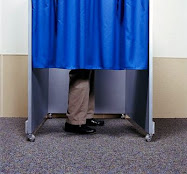giovedì 10 giugno 2010
martedì 8 giugno 2010
SLOVAKIA VERSO IL NUOVO PARLAMENTO

Sabato 12 giugno in Slovacchia si eleggeranno i 150 membri del parlamento. Come in tutti i paesi del mondo anche qui la televisione è il mezzo più usato dai partiti per la campagna elettorale. Questi sono i partiti in lizza e gli spot elettorali dai quali risalire per approfondire eventualmente la loro storia.
S-HZDS/PARTITO POPOLARE
SMER/PARTITO SOCIALDEMOCRATICO
KDH-MOVIMENTO DEMOCRISTIANO
SNS-PARTITO NAZIONALE SLOVACCO
http://www.sns.sk/video/sns-webtv/page/1/?play=sns-webtv-112010
MKP-COALIZIONE UNGHERESE
SAS- PARTITO DELLA LIBERTA' E SOLIDARIETA'
SDKU-DS - PARTITO DEMOCRATICO
Most–Híd - PARTITO DEL PONTE
SUPERMARTEDI' PER IL CONGRESSO USA
Welcome to the biggest primary day of the year! Eleven states -- from California to Arkansas to Maine (and everywhere in between) -- are voting today. We're devoting our Morning Fix today to five of the best storylines out in the country today. Stay tuned all day at The Fix and PostPolitics.com for the latest and greatest of the day (and night!) to come.
1. Pulaski, Pulaski, Pulaski!: In the Arkansas Democratic runoff between Sen. Blanche Lincoln and Lt. Gov. Bill Halter, the party establishment and the labor movement have engaged in a hand to hand voter identification and turnout war in the relatively small number of critical counties where this race will be decided.
Pulaski, a central Arkansas county located just minutes from downtown Little Rock, holds the key to Lincoln's chances of pulling off a win -- a result that would be considered a very slight upset at this point.
In the May 18 primary, Lincoln carried the county 52 percent to 40 percent over Halter thanks in large part to her margins among black voters. (According to the 2000 census, more than one in every three residents in Pulaski is African American.)
Organized labor, which has dumped millions of dollars into the race against Lincoln, has heavily targeted Pulaski in the three weeks between the primary and the runoff, understanding that Halter must cut into Lincoln's strength there to win.
Lincoln, not surprisingly, has done everything she can to hold on to her margin in Pulaski including an appearance at the end of last month in Little Rock by former President Bill Clinton -- a revered figure among black voters in Arkansas.
If you need to know how Lincoln's night is going, watch Pulaski.
2. Angle's outstate angle: Former state Assemblywoman Sharron Angle enters primary day in the Nevada Senate race as the frontrunner but polling -- and there has been lots of it -- suggests that there is a large enough chunk of undecided voters to hand an upset victory to either businessman Danny Tarkanian or former state party chairwoman Sue Lowden.
The best way to know how Angle is doing is to look at where the vote is coming from across the state. If Washoe County (Reno) and the so-called "Cow Counties" in the northern reaches of the state comprise a significant chunk of the overall Republican primary vote then Angle is a near-certain winner as her old Assembly seat is in the Reno area and her strong conservative credentials resonate particularly well with outstate voters.
Lowden and, to a lesser extent, Tarkanian, need Clark County (Las Vegas) to comprise an large proportion of the overall statewide vote to pull off an upset. As of June 4, Clark County voters made up 66 percent of all votes cast statewide in early balloting, according to figures from the Secretary of State's office.
3. Haley's Comet: Recent attacks on South Carolina state Rep. Nikki Haley (R) appear to only have made her stronger in the gubernatorial primary. The only question now is whether she can win 50 percent and avoid a runoff.
That prospect seemed unlikely as recently as three weeks ago when polls suggested that although Haley had moved into the pole position, she would be hard pressed to win a majority of the vote against a crowded Republican field that includes Rep. Gresham Barrett, state Attorney General Henry McMaster and Lt. Gov. Andre Bauer.
Then came the salacious allegations -- from two GOP campaign operatives -- that Haley had engaged in extramarital affairs with them. She vehemently denied the charges and, despite promises to the contrary, neither man produced anything close to full-proof evidence of a relationship. Haley also went on television with an ad featuring her husband and two sons that decried the "dark side" of the state's politics.
Rather than seeing her momentum slowed -- the clear goal of the timing of these "revelations" -- the opposite effect has taken hold as Haley appears to have grown into a sympathetic figure in the eyes of voters who view her as being unfairly attacked. (State Sen. Jake Knotts, a Republican, didn't help matters when he referred to Haley as a "raghead" in an interview with an Internet talk show recently.)
If Haley wins outright today, she will immediately become a major star nationally for a party desperately in need of fresh faces. Even if she comes close but falls short of 50 percent, Haley will still be the odds-on favorite as the runoff is only two weeks after today's primary.
4. Margin Matters: Polling conducted in the final week(s) of the California Senate Republican primary suggests that former Hewlett Packard executive Carly Fiorina is going to be the GOP nominee against Sen. Barbara Boxer (D).
The question now is how big Fiorina's margin will be over moderate former Rep. Tom Campbell and conservative state Assemblyman Chuck DeVore.
The bigger the margin, the quicker Fiorina will be able to move beyond the primary and focus her fire on Boxer. If neither Campbell, running to the middle, or DeVore, running to Fiorina's right, are able to come close to her then the next-day stories about whether she can unite the party will disappear. If she ekes out a win -- or underperforms polls suggesting a double digit (and growing) edge over Campbell, Fiorina may not get the bump she wants from her win.
It's not an insignificant point because Boxer will almost certainly start the general election campaign moments after Fiorina is confirmed as the nominee -- seeking to use her financial might ($9.7 million in the bank as of mid-May) to offer voters a less-than-flattering portrayal of the Republican nominee.
5. Inglis in trouble: Following losses by West Virginia Rep. Alan Mollohan (D) and Alabama Rep. Parker Griffith (R), South Carolina Rep. Bob Inglis may be the next target of voters looking to vent their unhappiness with the status quo.
Inglis' main problem is his vote in favor of the Troubled Asset Relief Program (TARP), a no-no in Republican party politics these days. His saving grace? A crowded primary field that will split the anti-Inglis vote although a runoff -- likely with Spartanburg County prosecutor Trey Gowdy -- seems like an inevitability.
And, in a runoff with the anti-Inglis vote united, it's hard to see how the Congressman pulls through.
Inglis isn't the only incumbent struggling to succeed with a strong anti-incumbent wind blowing in his face. In California, Rep. Jane Harman (D) has spent more than $520,000 as of mid-May in her rematch against Marcy Winograd (D), a schoolteacher who lost by 24 points to Harman in 2006.
Winograd has benefited from the support of Howard Dean's Democracy for America (founded by Howard Dean but now run by Dean's brother, Jim) and had emerged as a darling of some national liberal groups. Still, a Harman loss would be a major upset and a sign of just how bad the environment might be for incumbents.
With Aaron Blake and Felicia Sonmez from Washington Post
1. Pulaski, Pulaski, Pulaski!: In the Arkansas Democratic runoff between Sen. Blanche Lincoln and Lt. Gov. Bill Halter, the party establishment and the labor movement have engaged in a hand to hand voter identification and turnout war in the relatively small number of critical counties where this race will be decided.
Pulaski, a central Arkansas county located just minutes from downtown Little Rock, holds the key to Lincoln's chances of pulling off a win -- a result that would be considered a very slight upset at this point.
In the May 18 primary, Lincoln carried the county 52 percent to 40 percent over Halter thanks in large part to her margins among black voters. (According to the 2000 census, more than one in every three residents in Pulaski is African American.)
Organized labor, which has dumped millions of dollars into the race against Lincoln, has heavily targeted Pulaski in the three weeks between the primary and the runoff, understanding that Halter must cut into Lincoln's strength there to win.
Lincoln, not surprisingly, has done everything she can to hold on to her margin in Pulaski including an appearance at the end of last month in Little Rock by former President Bill Clinton -- a revered figure among black voters in Arkansas.
If you need to know how Lincoln's night is going, watch Pulaski.
2. Angle's outstate angle: Former state Assemblywoman Sharron Angle enters primary day in the Nevada Senate race as the frontrunner but polling -- and there has been lots of it -- suggests that there is a large enough chunk of undecided voters to hand an upset victory to either businessman Danny Tarkanian or former state party chairwoman Sue Lowden.
The best way to know how Angle is doing is to look at where the vote is coming from across the state. If Washoe County (Reno) and the so-called "Cow Counties" in the northern reaches of the state comprise a significant chunk of the overall Republican primary vote then Angle is a near-certain winner as her old Assembly seat is in the Reno area and her strong conservative credentials resonate particularly well with outstate voters.
Lowden and, to a lesser extent, Tarkanian, need Clark County (Las Vegas) to comprise an large proportion of the overall statewide vote to pull off an upset. As of June 4, Clark County voters made up 66 percent of all votes cast statewide in early balloting, according to figures from the Secretary of State's office.
3. Haley's Comet: Recent attacks on South Carolina state Rep. Nikki Haley (R) appear to only have made her stronger in the gubernatorial primary. The only question now is whether she can win 50 percent and avoid a runoff.
That prospect seemed unlikely as recently as three weeks ago when polls suggested that although Haley had moved into the pole position, she would be hard pressed to win a majority of the vote against a crowded Republican field that includes Rep. Gresham Barrett, state Attorney General Henry McMaster and Lt. Gov. Andre Bauer.
Then came the salacious allegations -- from two GOP campaign operatives -- that Haley had engaged in extramarital affairs with them. She vehemently denied the charges and, despite promises to the contrary, neither man produced anything close to full-proof evidence of a relationship. Haley also went on television with an ad featuring her husband and two sons that decried the "dark side" of the state's politics.
Rather than seeing her momentum slowed -- the clear goal of the timing of these "revelations" -- the opposite effect has taken hold as Haley appears to have grown into a sympathetic figure in the eyes of voters who view her as being unfairly attacked. (State Sen. Jake Knotts, a Republican, didn't help matters when he referred to Haley as a "raghead" in an interview with an Internet talk show recently.)
If Haley wins outright today, she will immediately become a major star nationally for a party desperately in need of fresh faces. Even if she comes close but falls short of 50 percent, Haley will still be the odds-on favorite as the runoff is only two weeks after today's primary.
4. Margin Matters: Polling conducted in the final week(s) of the California Senate Republican primary suggests that former Hewlett Packard executive Carly Fiorina is going to be the GOP nominee against Sen. Barbara Boxer (D).
The question now is how big Fiorina's margin will be over moderate former Rep. Tom Campbell and conservative state Assemblyman Chuck DeVore.
The bigger the margin, the quicker Fiorina will be able to move beyond the primary and focus her fire on Boxer. If neither Campbell, running to the middle, or DeVore, running to Fiorina's right, are able to come close to her then the next-day stories about whether she can unite the party will disappear. If she ekes out a win -- or underperforms polls suggesting a double digit (and growing) edge over Campbell, Fiorina may not get the bump she wants from her win.
It's not an insignificant point because Boxer will almost certainly start the general election campaign moments after Fiorina is confirmed as the nominee -- seeking to use her financial might ($9.7 million in the bank as of mid-May) to offer voters a less-than-flattering portrayal of the Republican nominee.
5. Inglis in trouble: Following losses by West Virginia Rep. Alan Mollohan (D) and Alabama Rep. Parker Griffith (R), South Carolina Rep. Bob Inglis may be the next target of voters looking to vent their unhappiness with the status quo.
Inglis' main problem is his vote in favor of the Troubled Asset Relief Program (TARP), a no-no in Republican party politics these days. His saving grace? A crowded primary field that will split the anti-Inglis vote although a runoff -- likely with Spartanburg County prosecutor Trey Gowdy -- seems like an inevitability.
And, in a runoff with the anti-Inglis vote united, it's hard to see how the Congressman pulls through.
Inglis isn't the only incumbent struggling to succeed with a strong anti-incumbent wind blowing in his face. In California, Rep. Jane Harman (D) has spent more than $520,000 as of mid-May in her rematch against Marcy Winograd (D), a schoolteacher who lost by 24 points to Harman in 2006.
Winograd has benefited from the support of Howard Dean's Democracy for America (founded by Howard Dean but now run by Dean's brother, Jim) and had emerged as a darling of some national liberal groups. Still, a Harman loss would be a major upset and a sign of just how bad the environment might be for incumbents.
With Aaron Blake and Felicia Sonmez from Washington Post
mercoledì 2 giugno 2010
Iscriviti a:
Commenti (Atom)



















